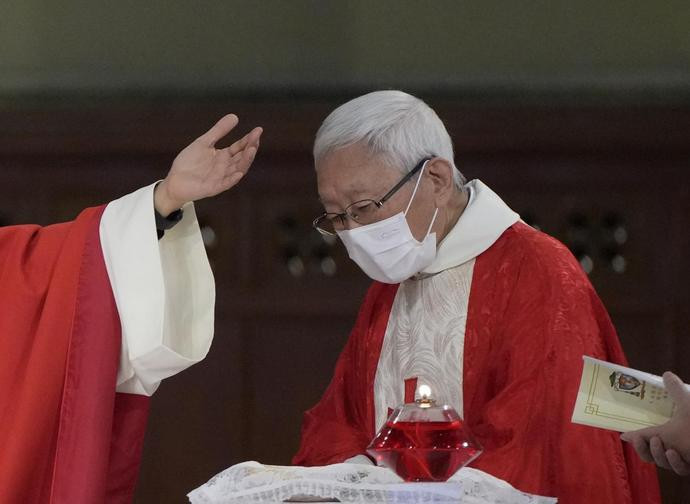Cardinal Zen’s arrest, a challenge for the Vatican
While the most recurrent question in the media concerns China's intentions, the arrest of 90-year-old Cardinal Zen poses a serious embarrassment for the Holy See, whose first reaction is predominant silence. At stake is the renewal of the secret agreement with China for the appointment of bishops, but it would be a disaster if the freedom of a cardinal and of the Church were sacrificed for this.

The arrest of Cardinal Joseph Zen in Hong Kong on May 11, under the National Security Act effective from 2020, is a shocking event that raises many questions and is an omen of very dark times to come and not only for Hong Kong. The fact that he was released on bail (as were the other three people arrested with him) does not detract from the gravity and brutality of the action.
As reported, Cardinal Zen is accused of having been part of a committee that collected and distributed funds to help pro-democracy activists who were arrested after the violent repression of the 2019 demonstrations against the new extradition law in China. This committee was actually closed down last October precisely because of the new national security law.
The question most frequently raised in the international press is why would China (there is no doubt that Beijing is behind the decision of the Hong Kong authorities) want to make such a move, to target a 90-year-old cardinal who has chosen to remain silent for many months now: “The persons in question,” the Hong Kong office of the Chinese Foreign Ministry has said, “are suspected of conspiring in collusion with foreign countries or forces, endangering national security. This is serious”. And the fact that it is a religious figure who has become the focus of police attention “is completely irrelevant”, according to the same Chinese office: “No one is above the law”. This, however, fails to answer the question. The fact is, says Mark Simon, who for ten years was the right-hand man of the Catholic publishing entrepreneur Jimmy Lai, who also finished in the meshes of the law for his participation in the democratic movement, “China is afraid of Cardinal Zen”. This was written in yesterday's Washington Post, pointing out that Zen remains “the last symbol of Hong Kong's democracy movement”, standing firm against pressure from the Chinese security apparatus. And he is still credited with considerable power “as a resistance force in Hong Kong's Catholic Church”. What makes Cardinal Zen dangerous to the Chinese regime, says Simon, is "his moral integrity, his courage, and the power of his witness", as well as "his humanity, generosity. and compassion". In other words, Simon concludes, "Cardinal Zen is everything the brutal Chinese regime is not"; it therefore sees him as a dangerous antagonist.
But while it is legitimate to ask questions about China's reasons, it is even more interesting to understand the Vatican's reactions. If the truth be told, Cardinal Zen is a nuisance for Rome, too. His criticism of the secret Sino-Vatican agreement on the appointment of bishops, signed just four years ago, has been harsh and repeated, and in particular he has blamed Cardinal Secretary of State Pietro Parolin, judged to be the main architect of this agreement. Nor can we forget what happened in September 2020, on the eve of the renewal of the agreement between China and the Holy See, when Cardinal Zen showed up in Rome asking in vain for a personal meeting with the Pope and had to return to Hong Kong humiliated and empty-handed.
The cursory statement issued by the director of the Holy See Press Office, Matteo Bruni, in the evening of 11 May, betrays embarrassment: "The Holy See has learned with concern the news of Cardinal Zen's arrest and is following the evolution of the situation with extreme attention", practically an attempt to take time to think about what to say and what to do. No mention of the Pope, his desirable closeness to an arrested cardinal, and his remembrance in prayer for those who are victims of such injustice. Not a word. The Holy See thinks first and foremost of its agreement with China, for which it will soon have to decide on its possible renewal, and avoids saying anything that might upset the Chinese interlocutor. Recently Cardinal Parolin hinted that even in the Vatican doubts were beginning to arise about the effectiveness of this agreement for the Catholic Church, and in an interview with Acistampa he said he hoped that something could be changed in the agreement. Whether intended or not, Cardinal Zen’s arrest is a clear response from the Chinese side: a show of strength, a demonstration of who is in charge and who dictates the conditions. Symbolically it also takes shot precisely at Cardinal Zen, the greatest opponent of this agreement.
From the first reactions, the impression is that the Holy See has been taken by surprise, showing that it has no knowledge at all of the Chinese communist regime or even of what is happening in Hong Kong. And that once again it will comply with the conditions imposed by Beijing, whatever they may be. That would be a disaster for the Chinese Church. One can only hope that, after the initial bewilderment, the Vatican will wake up and realise that the good of the Church cannot be at odds with the good of Catholics and with clarity about where the light of faith is. In the face of the brutal arrest of a 90-year-old cardinal who has always defended the Chinese Catholic people and the people of Hong Kong, it cannot even be suggested that the Holy See is on the side of those who persecute him. If there is a time to raise one's voice, it is now.
